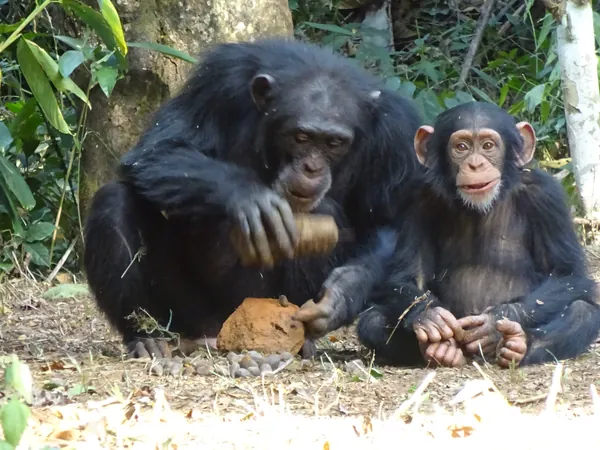
Chimpanzees' Tool Use Reveals Insights into Human-like Cognition and Behavior
2024-12-05
Author: William
Introduction
A groundbreaking study published in *PeerJ* on December 5, 2024, uncovers fascinating insights about the shared cognitive abilities of chimpanzees and humans, suggesting that the foundational skills necessary for advanced language and technological culture might have originated long before our species diverged from our closest relatives.
Complex Behaviors in Humans
Humans exhibit remarkably complex behaviors, particularly in the realm of communication and tool use. Everyday tasks, like making coffee or tea, involve breaking down actions into manageable sequences, which we can organize hierarchically. This organizational ability—wherein we might interject a clean-up task while proceeding with another—has long been considered a hallmark of human intelligence.
Chimpanzee Tool Use Study
However, this study led by the University of Oxford explores whether these complex behaviors are exclusive to humans or are also evident in wild chimpanzees, whose tool use might exhibit similar organizational characteristics. Collaborating with researchers from multiple countries, the study focused on the chimpanzees of Bossou forest in Guinea, where these primates were filmed cracking nuts—a behavior noted for its complexity among wild animals.
Findings on Chimpanzee Actions
Over three decades, the research team documented the actions of these chimpanzees performing tool-assisted tasks, amassing detailed footage of around 8,260 individual actions from over 300 nuts. By employing advanced statistical models to analyze the sequences, researchers found surprising parallels between the actions of chimpanzees and those of humans. Specifically, they observed that half of the adult chimps linked actions occurring much later in their sequences, indicating a level of advanced planning and flexibility.
Cognitive Skills and Variances
The researchers speculated that these chimpanzees demonstrated a form of cognitive skill similar to humans'—the capacity to organize actions into repeatable segments or 'chunks.' Notably, this ability didn't uniformly apply to all chimpanzees, suggesting variances in cognitive strategies among individuals. This opens up questions about the universality of these complex organizational strategies across non-human primates.
Significance and Implications
Dr. Elliot Howard-Spink, the lead researcher now affiliated with the Max Planck Institute of Animal Behavior, highlighted the significance of their findings. He stated, "The capacity to flexibly organize actions into tool-use sequences may have been key to the success of humans as a species." Furthermore, the implications of this research hint that core human behaviors may have evolutionary roots dating back to our last common ancestor with chimpanzees.
Connecting Language Evolution and Tool Use
Adding to the discourse, Professor Thibaud Gruber of the University of Geneva remarked on the connection between language evolution and tool use, emphasizing that this study enriches our understanding of early hominin behaviors. Meanwhile, Professor Dora Biro from the University of Rochester shed light on the pressing need for conservation efforts, noting that understanding the cultural behaviors of chimpanzees—threatened by habitat loss—could provide invaluable insights into our own evolutionary history.
Future Research Directions
As this research continues, the team aims to delve deeper into the possibilities of shared complex behaviors across great ape species and to uncover how such behaviors develop and morph throughout a chimpanzee’s life. This fresh perspective not only underlines the intricacies of primate intelligence but also serves as a poignant reminder of our connection to these incredible creatures, for understanding their skills may illuminate the very traits that define us as humans.
Conclusion
The implications of these findings could reshape our understanding of human evolution and the cognitive abilities shared with our closest relatives, encouraging a broader appreciation for the intricate lives of chimpanzees and the cultural behaviors they exhibit.









 Brasil (PT)
Brasil (PT)
 Canada (EN)
Canada (EN)
 Chile (ES)
Chile (ES)
 España (ES)
España (ES)
 France (FR)
France (FR)
 Hong Kong (EN)
Hong Kong (EN)
 Italia (IT)
Italia (IT)
 日本 (JA)
日本 (JA)
 Magyarország (HU)
Magyarország (HU)
 Norge (NO)
Norge (NO)
 Polska (PL)
Polska (PL)
 Schweiz (DE)
Schweiz (DE)
 Singapore (EN)
Singapore (EN)
 Sverige (SV)
Sverige (SV)
 Suomi (FI)
Suomi (FI)
 Türkiye (TR)
Türkiye (TR)